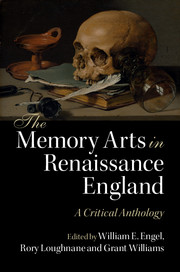Book contents
- Frontmatter
- Dedication
- Contents
- List of figures
- Acknowledgements
- A note on abbreviations
- Introduction
- PART I The art of memory
- PART II Rhetoric and poetics
- PART III Education and science
- PART IV History and philosophy
- Introduction to Part IV
- IV.1 Lodowick Lloyd, The Pilgrimage of Princes (1573)
- IV.2 William Camden, Remains Concerning Britain (1605)
- IV.3 Francis Bacon, The Advancement of Learning (1605)
- IV.4 Pierre Charron, Of Wisdom (1608)
- IV.5 John Weever, Ancient Funeral Monuments (1631)
- IV.6 Edward Reynolds, A Treatise of the Passions and Faculties (1640)
- IV.7 Thomas Fuller, selected works
- IV.8 Kenelm Digby, Two Treatises (1644)
- IV.9 Thomas Hobbes, Leviathan (1651)
- IV.10 William Dugdale, Baronage of England (1675–1676)
- PART V Religion and devotion
- PART VI Literature
- Index
- References
IV.3 - Francis Bacon, The Advancement of Learning (1605)
from PART IV - History and philosophy
Published online by Cambridge University Press: 05 August 2016
- Frontmatter
- Dedication
- Contents
- List of figures
- Acknowledgements
- A note on abbreviations
- Introduction
- PART I The art of memory
- PART II Rhetoric and poetics
- PART III Education and science
- PART IV History and philosophy
- Introduction to Part IV
- IV.1 Lodowick Lloyd, The Pilgrimage of Princes (1573)
- IV.2 William Camden, Remains Concerning Britain (1605)
- IV.3 Francis Bacon, The Advancement of Learning (1605)
- IV.4 Pierre Charron, Of Wisdom (1608)
- IV.5 John Weever, Ancient Funeral Monuments (1631)
- IV.6 Edward Reynolds, A Treatise of the Passions and Faculties (1640)
- IV.7 Thomas Fuller, selected works
- IV.8 Kenelm Digby, Two Treatises (1644)
- IV.9 Thomas Hobbes, Leviathan (1651)
- IV.10 William Dugdale, Baronage of England (1675–1676)
- PART V Religion and devotion
- PART VI Literature
- Index
- References
Summary
About the author
Francis Bacon (1561–1626) was perhaps the most gifted of early modern England's intellectual luminaries insofar as he played important roles in law, politics, literature, philosophy and science. His thought is credited with contributing to the seventeenth-century scientific revolution and inspiring the institution of the Royal Society (1660), England's first research academy of scientists.
About the text
The text is Bacon's first philosophical treatise to be printed and his only philosophical work to be published in English during his lifetime, all his other philosophical works being published in Latin for the purpose of reaching an international audience. The Advancement helped him to conceive a massive six-part research project Instauratio Magna, his great restoration of knowledge, and served as the project's initial part when translated and expanded into the De augmentis scientiarum (1623). The first excerpt below occurs near the end of book 1, which defends learning by addressing its errors and vanities and then by gathering evidence of its divine and human value; the second excerpt occurs in book 2, where moving from theory to practice Bacon covers the contemporary state of knowledge in order to proffer remedies for its deficiencies.
The arts of memory
Bacon stands at the crossroads of the memory arts, lamenting the textual sediment thickly besmearing knowledge while simultaneously vaunting the epistemic power of remembering and recollection along with their aids. The second excerpt accordingly gives us a glimpse of Bacon's ambivalent relationship to the artificial memory: on the one hand, he dismisses the exhibitionism of mnemonists and the ponderousness of using the art for business, and on the other hand he praises the keeping of commonplace books and acknowledges the principles underlying the twin elements of images and places. For all his suspicion of the art of memory, Bacon does not banish mnemonic activity to the margins of his epistemological reforms. In The Advancement, Bacon, recalling Sidney, aligns the psychology of the inner senses with the tripartite division of knowledge: poesy springing from the imagination, history from memory and philosophy from reason. Even more pointedly, De augmentis describes remembering as a kind of ‘memory thinking’ that makes possible rational inquiry. Similarly setting its sights on a grand vision of memory, the first passage below argues for learning's dignity on the basis of its commemorative function of perpetuating humankind's minds and immortalising their intellectual achievements.
- Type
- Chapter
- Information
- The Memory Arts in Renaissance EnglandA Critical Anthology, pp. 197 - 201Publisher: Cambridge University PressPrint publication year: 2016



